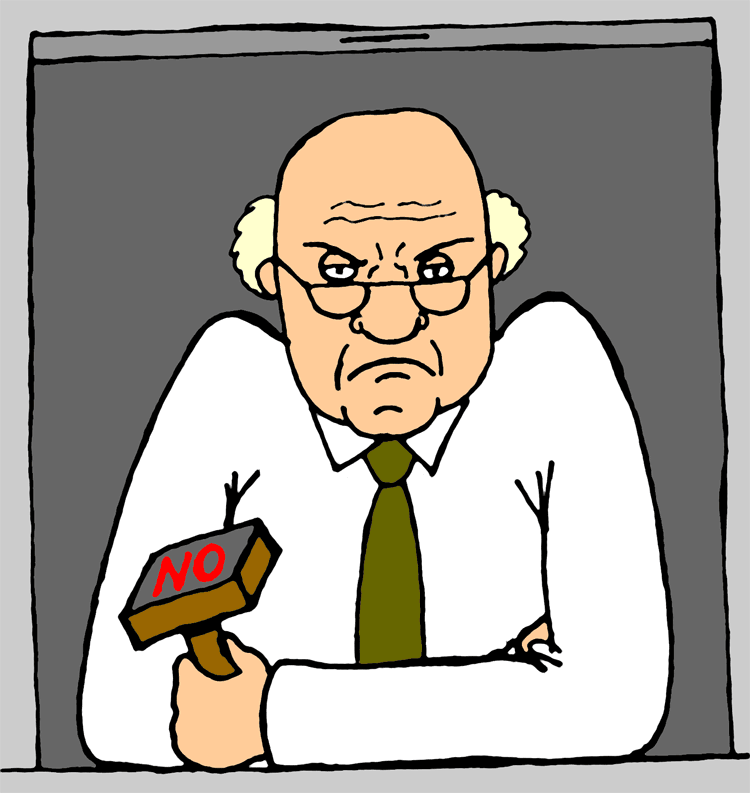Harnessing Unpredictability
 •
by
•
by LiveFreeOrDie
Lately, there has been much concern in the eUS expressed about player retention by heavyweights like Gaius Julius, Ligtreb, and Woxan. This article seeks to present a radical methodology of retaining players: Empower them!
A Critical Look at Centralized Decision-Making
Centralized planning and decision-making has many positive aspects in eRepublik, which has led it to be the main form of government in eRepublik. The main arguments in favor of centralized planning are as follows:
Centralized authority is part of game mechanics. This is quite true, as only the president has the capability to launch attacks or to retreat, and only congress has the authority to set tax policies and approve MPPs.

Game mechanics!
Centralized decision-making is necessary because new players cannot be trusted to make good decisions. The idea here is that new players and two-clickers do not understand the mechanics of the game and so need to be told what to do in order to be effective. For example, players need to be told where to fight in order to create a unified fighting force and maximum damage.

Silly newb!
Centralized control puts decision-making in the hands of the most active and knowledgeable players. The decision-makers are chosen in various ways - through elections, through connections to other players, and, especially, though forum posts and IRC.
Centralized decision-making keeps the country working together. By limiting access to decision-making influence to a few players, it becomes easier to arrive at decisions and to implement them.
But centralized decision-making has drawbacks as well, many of which tend to lead to player defections:
[img]http://2.bp.blogspot.com/_uwR9ycGD-IQ/SHSSPm81PeI/AAAAAAAAABE/Pp4u6WA4lq4/s400/iron%2Bfist.JPG[/img]
Centralization: The iron fist.
Centralized decision-making leaves the vast majority of players with nothing to do other than obey. Players are told that they must move to one of three fortress states. Players are told that they must fight in particular battles. Participation is limited generally to following the direction of a decision-maker, whether that be by participating as a mentor, ambassador, or a member of the military - most players are cast into the role of doing what they are told.

Gratuitous Princess Leia slave picture to maintain reader interest.
Centralized decision-making tends to create an information gap. A few players have information that must be protected from foreign interception. So most players are given orders with little or no explanation as to the thinking behind the orders.

Uninformed citizens can be duped.
Centralized decision-making leads to group-think. After an idea is accepted, players generally stop questioning it. Players who question, for example, the tax rates or fortress strategy are quickly shouted down. Group-think tends to limit innovation. Accepted ideas are not tested against competing ideas.

Group-think in-action.
Communication of orders makes our actions predictable. For example, citizen orders are quickly intercepted by our enemies. The necessity of communicating orders widely leads to enemy certainty as to our goals.

Predictability is soooo 2,009.
Centralized organizations break easily. Centralization and placing decision-making authority in the hands of a limited number of people leads to organizations that are dependent upon only a few people. If those people are away, centralized organizations cease to function or function poorly.

The eUS forums are the central site for eUS activity. They couldn't go down, could they?
Embracing Unpredictability

The Mandelbrot Fractal: Chaos can be beautiful.
The antithesis of centralization is decentralization: It is the embracing and harnessing of unpredictability. A good example is the Internet. Each packet that goes out over the Internet is only given an address and a methodology of determining whether it arrived at a node nearer the address intact. The decentralized nature of the Internet makes it very difficult to break. It's impossible to predict the route that a group of packets will take in arriving at a destination, but this is irrelevant. The important factor is whether the destination is arrived at.
In eRepublik, decentralization is empowering ordinary citizens to take action and make relevant decisions. How would such a structure work? I will give some relevant ideas and examples.
Military decentralization The militia movement is an example of a decentralized military. The national government provides some funding to militias, but they are self-funded for the most part.

Sasquatches get together and form a militia.
Another way that unpredictability could be harnessed in the military is with citizen orders. Rather than provide one unique battle in which to fight, citizens could be given two or more options of battles to fight in. Neither the national government nor the enemy would then know how much damage would be done in the battles. The military could decide where and when to place resources based on the results of the fighting. It would be challenging to the military, but even more challenging to the enemy, who would have no way to predict how much damage to place in a given battle. The only way to defend would be to overspend in each battle.

Battalgazi prepares for eUS battles.
Providing a choice in battles makes the decision of each citizen important, and they will seek to make better decisions - they will try to find out whether they should wait to attack in one region or to attack another region immediately. Eventually, this system would implement crowd-sourcing of eUS battles. The military's job is to finish the battles and to provide meaningful options for the citizens.
Program decentralization Rather than having a small number of large, monolithic government programs (Guns for Huns, Welcoming Committee, Flying Unicorns, etc.) players could be encouraged to create a large number of smaller programs that fulfill the same goals. These programs would be in competition with one another, and the programs that run the most efficiently would prosper, while inefficient programs would fail. Smaller, decentralized programs would tend to have better ratios of volunteers to players served, and the competition would cause programs to innovate to better serve their constituencies.

Decentralized systems are difficult to break.
Harnessing Unpredictability
Unpredictability must be controlled and harnessed to keep the goals of small agencies in line with government goals. Otherwise, unpredictability will only lead to chaos. In this sense, central control must remain and be stable. I propose a new structure to promote and control the unpredictable forces of decentralization: a bureaucracy.
The bureaucrats, who will be appointed by the executive branch and serve two-month terms (subject to no-confidence votes by congress), would serve as enablers and controllers of decentralized programs. Bureaucrats would take matching funds allocated by Congress, evaluate grant requests, and distribute the funds to organizations. The bureaucrats would evaluate the effectiveness of programs and provide funding based on their effectiveness.

Well, our bureaucrats will be incented to say "yes"!
Bureaucrats could receive government bonuses based on the effectiveness of the programs they fund and whether those programs are meeting the goals of the executive branch and congress. Bureaucrats would provide funding based on matching funding already in organizations up to a certain amount, and would require accurate reporting of use of the funds and effectiveness of programs. The bureaucrat would be subject to defunding requirements of the agency that they represent (military, Interior, education, etc.).
Bureaucrats would report up program effectiveness and would distribute funds. Bureaucracy is a necessary part of any effective government, and having a class of dedicated career bureaucrats would provide a source of government and program stability.
Goals would be set by the executive; funds would be allocated by congress; and bureaucrats would handle evaluation and distribution of funds.

Sometimes, red tape can be a GOOD thing.
In summary: I believe that the best way to retain citizens is to give them opportunities to participate in meaningful ways. The best way to do this is to give them the ability to form groups and pursue goals.


Comments
I liked a lot of it, but we should start the implications in peace time that way its during peace that we can work out the kinks
Amazing read. Thought provoking.
I steal tons of ideas from this guy. It helps that I know him in RL.
LFoD - the best asset the eUS has that almost no one knows about.
Always a good read, very insightful.
Very interesting read!
While there may be some value in some applications, for many things I fear that this would not be the best course.
A well put paradigm analysis! I do think a bureaucratic class would be beneficial to the game, especially in positions that deal with data and citizen retention. In some ways we have that already. Should we turn the Welcoming Committee into a league of smaller retention groups? Lean on the parties for more help?
Excellent questions, sydiot, to which I do not pretend to have adequate answers. I'm drawing in very broad strokes here, and there would be many details left to the legislative and executive branches.
The goals are two-fold, however: Provide for a competitive landscape for meeting government goals with a control and reward mechanism and provide more ways for citizens to be active in meaningful ways. The hoped-for outcomes would be better services with better use of taxpayer funds and higher citizen retention.
LFoD is a great US thinker and I love this article!
Very insightful and thought provoking. What do you see as the potential rewards for successful bureaucrats, what do you see as the rewards for successful organizations?
Are you suggesting paying "volunteers"?
To clarify my question I offer the eUS military as a counterpoint to the volunteer Meals on Wheels/Welcoming Committee. I understand how the Army is rewarded in a way (free weapons). There is some competition for resources (gold) and a definable goal (maximize damage of your army unit for gov funds distributed).
How do you perceive that a bureaucrat could measure the success of a smaller volunteer mentor/gifting/messaging organization?
Maybe these questions are too detail oriented for this article but they will need some answers. Great piece I was truly intrigued, not yet convinced, but interested.
Great work! Truly great!
voted, subscribed, friend requested
This article gives me something to think about.
nice work.
+1 for militias like St6
One of the best articles I've read in a long time.
Very different. Very nice. This would be quite the experiment. 🙂
I voted because of the Princess Leia pic, but it turns out that the article was very thought provoking!
keep up the good work
Wow. Epically intelligent, yet understandable and relevant.
Subscribed.
Interesting. Voted and subbed.
This is a really great way to think of the game. This structure could theoretically be tested side by side to the current structure. A small "grant" organization could be set up to begin fielding requests.
The major issue I have is the potential for wasted labor and resources. If 15 organizations all contact the same new player, but overlook another because they all started with the "A" states and didn't make it to the end it is a problem.
I know, for instance, that several "information/intelligence based" groups have recently been established that are doing things that are being done in other places. The redundancy is not productive for either set of players. The benefit of a central agency is that it can demand specialization from its branches to ensure as minimal amount of repeated labor as possible.
If this were to be implemented it would be necessary to have an extremely informed oversight panel with a mandate to ensure cooperation between the groups. Fighting for and hoarding data wouldn't be the intended byproduct of this plan but it would be possible.
At what point do you think groups would be able to compete productively vs. not?
elizabopolous,
You make very good points. Let me tell you it's possible to address them:
Wasted effort: This is an issue of information flow. I don't think that multiple early contacts by various agencies would be a bad thing, but once a citizen signs on with a particular agency, then that citizen is off limits unless the citizen has a complaint or is not receiving services. Each organization that receives funding would need to present a by-name/by-profile number accounting of services provided. The bureaucracy would have to check citizens receiving the same services from different agencies. It may seem like a monumental task, but our developing database infrastructure will ease this substantially.
Oversight: There are multiple checks and balances within my scheme with both the executive and legislative branches having different levers to pull (executive appoints bureaucrats, sets goals, and can impose defunding of organizations; congress allocates money and can remove bureaucrats with no-confidence votes).
The linchpin of the scheme will be identifying bureaucrats with integrity, as they would be able to falsify reports or to give money to their friends or in response to bribes or political favors.
If successful, the bureaucracy would become the third pillar of government. As Sydiot pointed out, in many ways we already have this, as a few active players tend to maintain their programs for long periods of time (such as Ligtreb and previously Cerb), and the same players tend to be appointed from cabinet to cabinet for important positions.